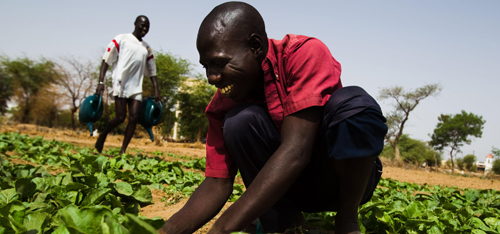Regional and country projects
South-South cooperation
The first IPPM training in Niger was conducted by experienced Master Trainers from Benin. Similarly, first trainings in Mauritania were by experienced Senegalese Master Trainers and those in Guinea by the experienced team from Mali. Bus tours have taken place in which farmers from one country have visited IPPM farmers in an adjacent country.
The key to the continued success of this programme has been in building and strategically employing the existing ‘social capital’, which exists in the experience and human resources developed over the course of the past 12 years. As the cadres of trainers and experienced farmers in each country continue to grow and improve, so does the potential of the IPPM programme to expand and improve as a regional force to help underpin agricultural development in its many forms.
Supporting governments and national stakeholders
In response to the deregulation and liberalization that have gradually eroded countries’ capacity to develop and implement strategies, IPPM is working with governments and stakeholders to build upon existing initiatives in line with national strategies for agriculture sector development. Project activities in Benin, Burkina Faso, Guinea, Mali, Mauritania, Niger, Senegal, Tanzania and Zambia are implemented according to sectoral programmes of subregional bodies and established international frameworks.
Developing value chains
IPPM project activities are tailored with special attention to the development of the entire value chain, from tackling policy constraints to improving farmers’ capacity to access and manage credit, inputs and equipment. The programme works with an integrated approach in mind to improve agricultural systems, reduce losses and strengthen farmers’ ability to market their products. For e.g. in Mali, Mauritania, Niger and Senegal, the programme is contributing to the development of the rice value chain in the region.
Sustaining the cotton sector
Cotton is an important cash crop in many African countries, providing a living to millions of smallholder farmers. Major constraints however exist, including the overall lack of competitiveness of the sector and the very high rates of highly toxic chemical pesticides routinely applied to cotton. FAO is working with partners to turn around the limitations faced by Burkina Faso, Mali, Senegal, Tanzania and Zambia in the development of the cotton sector. In line with regional strategies, IPPM consistently works with cotton farmers and producers to build capacities and improve production while safeguarding their health and environment.
Monitoring and communicating pesticide risks
The IPPM programme works closely with governments and partners to raise awareness at all levels on the importance of reducing or eliminating the use of toxic pesticides in agriculture. Recent partnership with Oregon State University has resulted in the development of major new tools that assist in the monitoring of pesticides in the environment and estimate potential negative effects. To this end, water samples were tested along the Senegal and Niger rivers and combined with community surveys to generate results. It is hoped that these results will inform decision-makers at national and regional level, and help them to make sound policies and regulations that comply with international treaty commitments.
Climate change adaptation
A growing number of IPPM projects are being funded under the GEF/LDCF climate change adaptation fund, including projects underway in Mali and Niger, and pipeline projects in Senegal and Burundi. These projects represent the ultimate challenge for agricultural development in the region and require the distillation and coming together of all the lessons’ learned to date in the IPPM programme.

